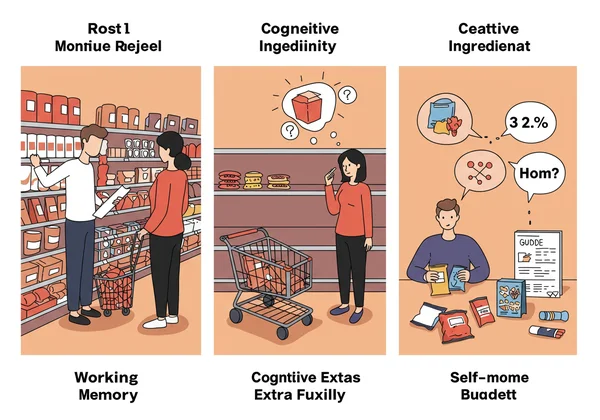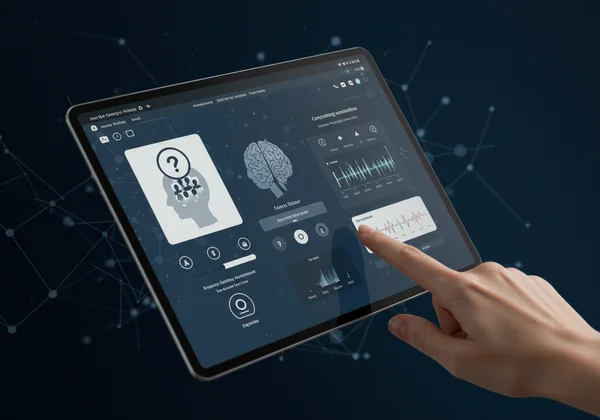Executive Functions: What They Are, Why Assess Them, and How a Cognitive Assessment Can Help
October 8, 2025 | By Gideon Albright
Ever wonder why some days you're a productivity powerhouse, seamlessly juggling tasks and making sharp decisions, while on other days you struggle to focus or even start a simple to-do list? The answer often lies in your executive functions – the powerful set of mental skills that act as the brain's control center. Understanding these skills is the first step toward optimizing your mental performance. A comprehensive cognitive assessment can provide the map you need. But why would someone need a cognitive assessment? This article will dive deep into these critical cognitive skills, explaining what they are, why they're vital for daily success, and how understanding them through a specialized cognitive skills test can empower you.
What Are Executive Functions? Unpacking the Brain's Control Center
Think of executive functions as the CEO of your brain. They are a group of high-level mental processes that enable us to plan, focus attention, remember instructions, and manage multiple tasks successfully. They don't represent what you know, but rather how you use what you know. This "management system" is crucial for goal-directed behavior and allows us to adapt to new situations and navigate the complexities of life.
While intricate, these functions are generally understood through three core pillars. Gaining clarity on these components is the first step toward understanding your own cognitive profile.

Defining the Core Components: Working Memory, Flexibility, Self-Control
To truly grasp executive functions, we need to look at the key players on the team. These three skills work in tandem to guide your actions and thoughts:
-
Working Memory: This is your brain's mental "sticky note." It's the ability to hold information in your mind and manipulate it over short periods. You use it when you remember a phone number just long enough to dial it, follow multi-step directions, or perform mental math. Strong working memory is essential for reading comprehension, problem-solving, and staying on track during a conversation.
-
Cognitive Flexibility: Also known as flexible thinking, this is your ability to switch gears and adapt your thinking to new, changing, or unexpected circumstances. It allows you to see a problem from different perspectives, adjust your strategy when the old one isn't working, and seamlessly transition between different tasks. High cognitive flexibility is a hallmark of creative problem-solvers and resilient individuals.
-
Inhibitory Control (or Self-Control): This is the skill that helps you resist temptations, pause before acting, and stay focused on your goals despite distractions. It’s what stops you from checking your phone every two minutes while working on an important project or making an impulsive purchase. Self-control is fundamental for maintaining focus, managing emotions, and acting in a manner consistent with your long-term goals.
Real-World Examples: Executive Functions in Action

These concepts might sound abstract, but you use them every single minute of your day. Let's consider a common task: planning a dinner party.
Your working memory helps you keep the guest list, dietary restrictions, and shopping list in your head as you move through the grocery store. Your cognitive flexibility comes into play when you discover a key ingredient is out of stock, forcing you to quickly devise an alternative menu item. Finally, your self-control helps you stick to your budget and resist buying extra snacks that aren't on the list, ensuring you stay focused on the goal. These skills are the invisible architecture behind successful outcomes.
Why Executive Functions Matter: Impact on Your Daily Life
Strong executive functions are a powerful predictor of success in virtually every area of life. They are more indicative of academic and career achievement than IQ alone. When these skills are sharp, we are more organized, efficient, and adaptable. When they are weak, life can feel chaotic and overwhelming. A deeper understanding can be gained through an online cognitive assessment.
Enhancing Work Productivity and Academic Performance
In any professional or academic setting, executive functions are your MVP. They allow you to:
- Plan and Prioritize: Breaking down large projects into manageable steps and deciding what to tackle first.
- Stay Focused: Ignoring office chatter or social media notifications to concentrate on the task at hand.
- Meet Deadlines: Managing your time effectively and initiating tasks without procrastination.
- Adapt to Feedback: Using constructive criticism to adjust your approach and improve your work.
Students rely on these skills to organize their study schedules, and professionals need them to navigate complex projects and lead teams. Improving your cognitive performance in these areas can directly lead to better grades, career advancement, and reduced stress.
Navigating Relationships and Personal Organization
The impact of executive functions extends far beyond the office or classroom. They are critical for managing your personal life and building healthy relationships. For instance, self-control allows you to listen patiently in a disagreement instead of reacting impulsively. Working memory helps you remember important dates and commitments, showing others they are valued.
Effective personal organization, from managing household chores to paying bills on time, is almost entirely dependent on these skills. By understanding your executive function profile, you can identify areas for improvement that can bring more order and harmony to your personal life.
How Are Executive Functions Assessed? Understanding the Process
If executive functions are so important, how can we measure them? Traditionally, this has been done through lengthy, one-on-one sessions with a neuropsychologist using various standardized tests. These assessments are incredibly valuable but can often be expensive, time-consuming, and difficult to access.
This is where modern technology provides a powerful alternative. By understanding the assessment process, you can feel confident in the insights you receive.
Cognitive Flexibility Tests and Other Key Measures
A robust executive function assessment will evaluate each of the core components. For instance, a cognitive flexibility test might involve tasks that require you to switch between different sets of rules. Working memory could be tested by asking you to recall and reorder a sequence of numbers or letters. Inhibitory control is often measured by your ability to suppress a habitual response in favor of a less obvious one.
These individual measures are then synthesized to create a comprehensive profile of your cognitive strengths and weaknesses, providing a clear picture of how your brain's "CEO" is performing.
The Role of Online Cognitive Assessments in Gaining Insight
Today, you can access powerful insights from the comfort of your own home. Platforms like our online cognitive assessment tool use AI-driven analysis to provide a detailed and personalized evaluation of your executive functions and other key cognitive domains. This AI-powered approach combines clinically-informed test design with sophisticated analysis, offering a level of nuance that goes beyond standard online quizzes.

The benefit of an AI-driven assessment is that it doesn't just give you a score; it provides actionable insights. You can receive a detailed report outlining your specific cognitive profile, highlighting your strengths, and suggesting practical steps for improvement. It’s a convenient, accessible, and confidential way to begin your journey of cognitive self-discovery.
Strategies to Boost Your Executive Functions for Better Performance

The great news is that your executive function skills are not set in stone. The brain is remarkably adaptable, and with targeted effort, you can strengthen these crucial abilities at any age. After you discover your results, you can begin implementing strategies tailored to your unique profile.
Brain Training Exercises and Mental Challenges
Engaging your mind in novel and complex activities is like taking your brain to the gym. Activities that specifically challenge your executive functions are particularly effective. This includes:
- Strategy Games: Chess, Go, and even complex video games require planning, flexibility, and impulse control.
- Learning a New Skill: Whether it's a musical instrument, a new language, or a coding language, the process of learning forces your brain to build new neural pathways.
- Puzzles and Riddles: Crosswords, Sudoku, and logic puzzles directly engage your working memory and problem-solving skills.
Lifestyle Adjustments for Optimal Brain Health
Your cognitive function is deeply connected to your physical well-being. To support your brain's CEO, you need to provide the right resources. Prioritizing these three areas can lead to significant improvements in your overall brain health:
- Physical Exercise: Aerobic exercise has been shown to have a direct positive effect on executive functions, improving blood flow to the brain and promoting the growth of new neurons.
- Quality Sleep: Sleep is when your brain consolidates memories and clears out metabolic waste. Consistently getting 7-9 hours of quality sleep is non-negotiable for peak cognitive performance.
- Mindfulness and Meditation: Practices that train your attention and awareness can directly strengthen your inhibitory control and help you become less reactive to distractions.
Empower Your Mind: Your Next Steps in Understanding Executive Functions
Your executive functions are the conductors of your life's symphony, directing your attention, thoughts, and actions to create a coherent and successful whole. Understanding them is not just an intellectual exercise; it's a practical step toward a more focused, organized, and fulfilling life. By recognizing their role in everything from professional success to personal happiness, you can begin to work with your brain, not against it.
The journey starts with awareness. An objective, detailed look at your cognitive profile can provide the clarity you need to take targeted action. We invite you to start your assessment today and unlock a deeper understanding of your mind.
Frequently Asked Questions About Executive Functions & Cognitive Assessment
What is a cognitive assessment?
A cognitive assessment is a structured evaluation of your key mental abilities, such as memory, attention, reasoning, and executive functions. It's designed to identify your cognitive strengths and challenges. An online tool like ours provides a convenient and comprehensive way to get these insights from home. Take a brain health check to learn more.
Why would someone need a cognitive assessment?
People seek cognitive assessments for many reasons. Lifelong learners may want to optimize their performance, adults may be concerned about age-related memory changes, and professionals may need to understand how to boost their productivity. An assessment provides a baseline of your cognitive health and offers personalized insights for improvement. It is an empowering first step in proactive brain health management.
How can I test my cognitive ability at home?
You can test your cognitive ability at home using scientifically designed online platforms. Our AI-powered cognitive assessment platform offers a comprehensive, AI-powered cognitive skills assessment test that evaluates multiple domains, including executive functions. This provides a safe, private, and accessible alternative to traditional testing methods. Explore our test to see how it works.
How do you tell if you have cognitive decline?
Signs of cognitive decline can include persistent trouble with memory, difficulty concentrating, or challenges with planning and problem-solving that interfere with daily life. While an online assessment can provide valuable insights into your current cognitive function, it is not a diagnostic tool. If you are concerned about significant cognitive decline, it is essential to consult with a healthcare professional. You can use the results from your online assessment as a helpful starting point for that conversation.